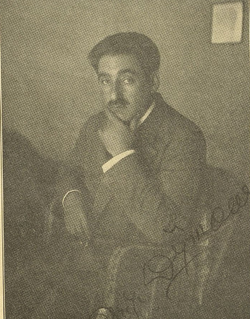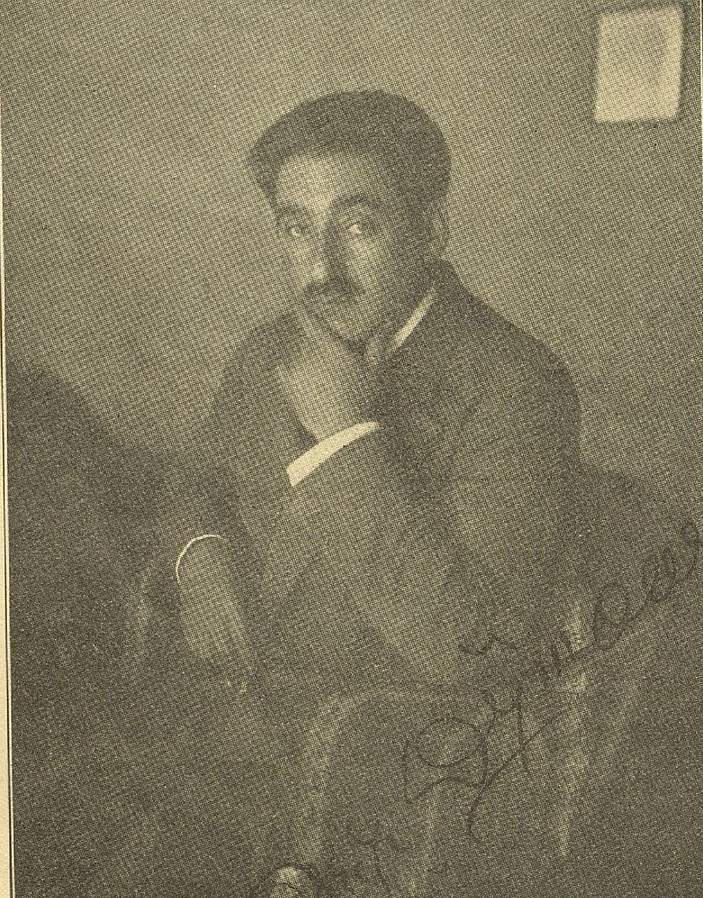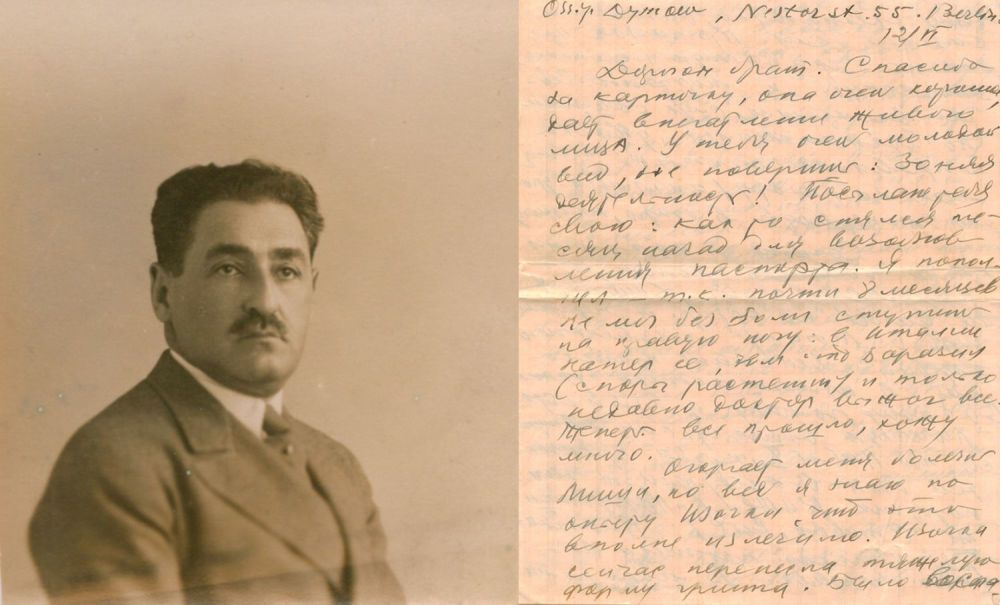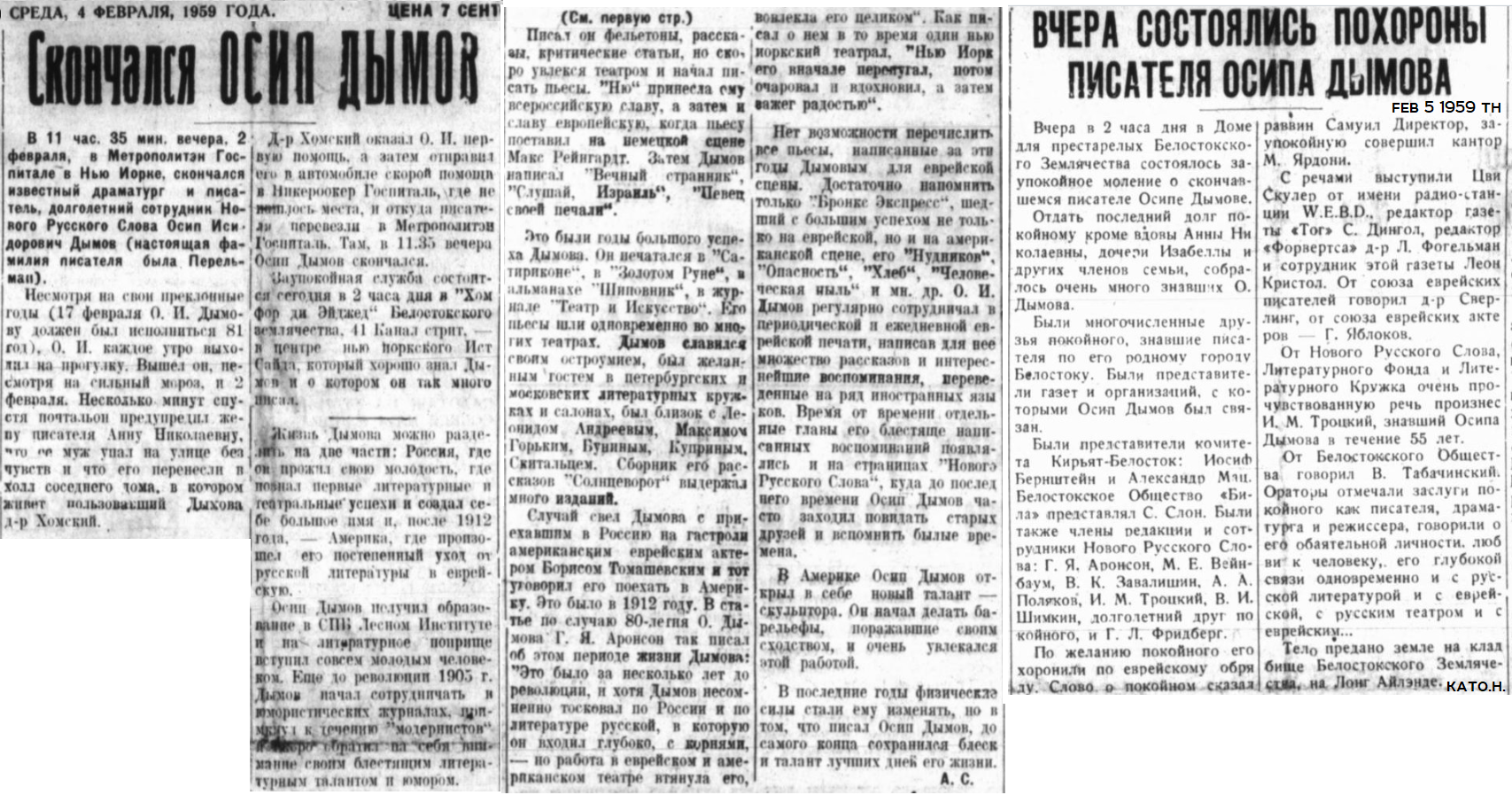a Russian writer. His brother was science writer Yakov Perelman. [Feb 16, 1878 - Feb 9, 1959]
Dymov's father came from Germany and died when Yosif was quite young. In 1902, Dymov graduated from the St Petersburg State Forestry Engineering Academy and emigrated to the United States in 1913.
Dymov was born in Bialystock in 1878 into a modern Jewish family. His mother was a foreign language teacher and Dymov attended the local high school instead of a yeshiva. He began his literary career writing for humourous Russian journals and small newspapers including Satirikon, Rus and others. While still in Europe, he wrote dramas for the Russian theater and they were performed and translated into many languages, one of which was made into a movie.
Thomashefsky performed Dymov's Russian play Hear O Israel in Yiddish after reading the text in its Russian original. During a tour of Lodz in 1913, he invited Dymov to write for his theater in America after seeing a Russian performance of The Eternal Wanderer. In America, Dymov began writing for the Yiddish paper Der Tog and the journal Kunds. A very popular playwright, his works were performed at Thomashefski's National Theater, Adler's Grand Theater, People's Theater, Second Avenue Theater, The Folksbiene and the Yiddish Art Theaters. Actors who appeared in his plays include Thomashefsky, Adler, Buloff, Ben-Ami, Schildkroit, Luba Kadison and Satz. Dymov directed many of these productions himself.
With the Vilna Troupe in 1924, Joseph Buloff directed a historic production of Dymov's Yoshke Musicant in Romania, interpreting it in grotesque form as seen through the eyes of child. Buloff included the play in his repertoire throughout his career, staging it again at the Folksbiene in the 70s. When Dymov heard of the success of Buloff's absurd reworking of the play, he quipped: "How marvelous! Who wrote it?" Maurice Schwartz directed Dymov's work Bread at his Art Theater in 1923 and produced Dymov's plays throughout the history of his theater.
Among Dymov's most successful works are Bronx Express , Slaves of the Public ( a satirical play about the Yiddish theater), The Eternal Wanderer , Hear O Israel , The Day of Judgment, Between Peoples,Yoshke Musicant: The Singer of his Sorrows, and Bread.
brother;
WHERE IS THIS CEMETERY? what or which part of a jewish cemetery in new york?
The body was interred at the Bialystok Community Cemetery on Long Island. / Тело предано земле на кладбище Белостокского Землячества на Лонг Айлэнде
a Russian writer. His brother was science writer Yakov Perelman. [Feb 16, 1878 - Feb 9, 1959]
Dymov's father came from Germany and died when Yosif was quite young. In 1902, Dymov graduated from the St Petersburg State Forestry Engineering Academy and emigrated to the United States in 1913.
Dymov was born in Bialystock in 1878 into a modern Jewish family. His mother was a foreign language teacher and Dymov attended the local high school instead of a yeshiva. He began his literary career writing for humourous Russian journals and small newspapers including Satirikon, Rus and others. While still in Europe, he wrote dramas for the Russian theater and they were performed and translated into many languages, one of which was made into a movie.
Thomashefsky performed Dymov's Russian play Hear O Israel in Yiddish after reading the text in its Russian original. During a tour of Lodz in 1913, he invited Dymov to write for his theater in America after seeing a Russian performance of The Eternal Wanderer. In America, Dymov began writing for the Yiddish paper Der Tog and the journal Kunds. A very popular playwright, his works were performed at Thomashefski's National Theater, Adler's Grand Theater, People's Theater, Second Avenue Theater, The Folksbiene and the Yiddish Art Theaters. Actors who appeared in his plays include Thomashefsky, Adler, Buloff, Ben-Ami, Schildkroit, Luba Kadison and Satz. Dymov directed many of these productions himself.
With the Vilna Troupe in 1924, Joseph Buloff directed a historic production of Dymov's Yoshke Musicant in Romania, interpreting it in grotesque form as seen through the eyes of child. Buloff included the play in his repertoire throughout his career, staging it again at the Folksbiene in the 70s. When Dymov heard of the success of Buloff's absurd reworking of the play, he quipped: "How marvelous! Who wrote it?" Maurice Schwartz directed Dymov's work Bread at his Art Theater in 1923 and produced Dymov's plays throughout the history of his theater.
Among Dymov's most successful works are Bronx Express , Slaves of the Public ( a satirical play about the Yiddish theater), The Eternal Wanderer , Hear O Israel , The Day of Judgment, Between Peoples,Yoshke Musicant: The Singer of his Sorrows, and Bread.
brother;
WHERE IS THIS CEMETERY? what or which part of a jewish cemetery in new york?
The body was interred at the Bialystok Community Cemetery on Long Island. / Тело предано земле на кладбище Белостокского Землячества на Лонг Айлэнде
Sponsored by Ancestry
Advertisement
Advertisement




